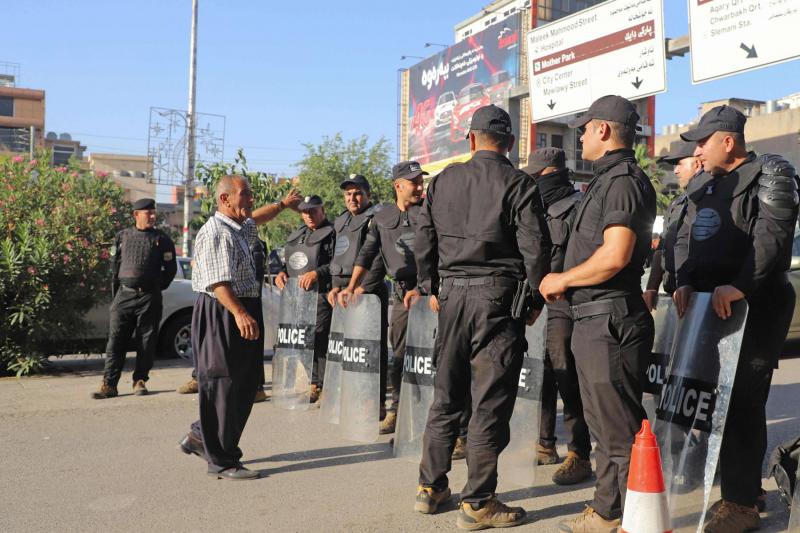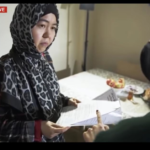Since Turkey launched a new military campaign in northern Iraq on April 23, three civilians have been killed and four wounded.
Amongst those, according to Turkish President Recep Tayyip Erdogan was a senior official from Turkey’s outlawed Kurdistan Workers Party (PKK).
In the face of Turkey’s actions, some 1,500 people from 300 families have fled their villages, according to Iraq’s ministry for the displaced.
One of them is Yohanna Khushfa who gathered his 200 sheep and took off in May, along with 120 other villagers in Iraqi Kurdistan, fearful of the Turkish drones hunting Kurdish separatists.
“Shrapnel blew out our windows and furniture,” the mayor of Jelki, a village in the Al-Amadiya area, said.
“We were afraid for our lives and we left,” said the 71-year-old, reached by telephone from a rugged strip near the Turkish border.
Others already left long ago, among them Berqi Islam, who fled in 2017 from Shiladzi, an area near the border where his brother was killed in Turkish bombing.
With his family’s farmland burnt down and no compensation paid by Iraqi Kurdish or federal authorities, he has yet to return.
Erdogan, who has threatened to “clean up” parts of northern Iraq, accuses the PKK of using the mountainous border area as a springboard for its insurgency.
The PKK has waged a rebellion in the mainly Kurdish southeast of Turkey since 1984 that has claimed more than 40,000 lives.
— Turkey’s growing clout —
Erdogan is willing to move “Turkey’s ongoing military confrontation with the PKK from Turkey to territory the PKK controls or transits through in Iraq,” said Aykan Erdemir, senior director of the Turkey Programme at the Foundation for Defense of Democracies.
He said Baghdad and Erbil, the capital of Iraqi Kurdistan and an ally of Ankara, appear to have accepted this.
The growing Turkish involvement on the ground in Iraqi Kurdistan “has been evolving into a permanent Turkish presence in the region”, said Erdemir, a former opposition lawmaker in Turkey.
The Iraqi state, tied up with chasing down remnants of the Islamic State group and often challenged by pro-Iran Shia armed groups “has no means of pressure on the PKK to make it leave,” explained Adel Bakawan, director of the French Centre for Research on Iraq (CFRI).
In a sign of Turkey’s growing confidence, its defence minister visited troops on Iraqi soil in early May, even though the dozen bases and other military posts that the Turkish army has set up over the past quarter of a century are illegal in the eyes of Iraqi law.
Baghdad has summoned the Turkish ambassador several times in protest over Turkey’s military actions, but the bombs continue to fall, taking away 2.5 percent of Iraq’s forested areas, “an inhuman environmental crime” in the words of Iraqi President Barham Saleh.
— Deeper incursions —
And the Turkish incursions are getting deeper, up to 20 kilometres (12 miles) inside Iraqi Kurdistan, said Kurdish MP Rivink Muhammad, himself from Al-Amadiya.
“Until the latest campaign, Turkish forces were entering through the border posts, but now they are setting up their own routes to avoid the official crossings,” added colleague Ali Saleh.
Ankara, the PKK charges, wants a repeat of the situation in northern Syria, where Turkey has since 2016 conducted three military offensives that have left it in control of more than 2,000 square kilometres.
Turkish Defence Minister Hulusi Akar on Sunday defended his country’s actions.
“All of our operations only target terrorists, respecting international law and respecting the territorial integrity of our neighbours, particularly Iraq,” he told reporters.
But he warned they would “continue until the last terrorist is neutralised… Our duty is to destroy all of the villains’ nests.”
Zagros Hiwa, a PKK spokesman, said that Ankara was determined to block any dream of a Greater Kurdistan straddling Syria, Iraq, Iran and Turkey.
Turkey’s military forays are “strategic, they aim to occupy Kurdish areas to cut off contacts between the Kurds (of the four countries) and eventually create a security cordon”, he said.
Source: Arab Weekly



